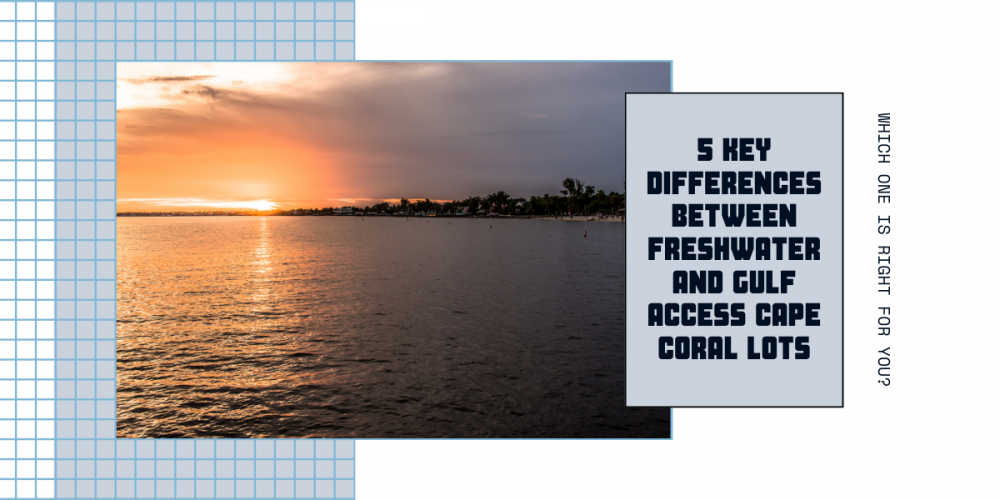
Cape Coral, Florida is a paradise for water lovers. With over 400 miles of navigable waterways, it's no wonder that this city has earned its nickname as the "Waterfront Wonderland." When considering moving to Cape Coral, one of the key decisions you'll need to make is whether to opt for a freshwater or gulf access lot. Both offer unique benefits and experiences. Here are five differences between these two types of lots.
Understanding Waterway Types:
The first difference lies in understanding what each type of waterway offers. Freshwater lots in Cape Coral are typically located on man-made lakes and canals with no access to open sea or ocean waters. These bodies of water provide beautiful views and opportunities for boating, and fishing right from your backyard.
On the other hand, Gulf Access lots are connected via canals directly to larger bodies like the Caloosahatchee River leading out into the Gulf Of Mexico or Matlacha pass offering an open gateway for avid boaters and fishermen who dream about deep-sea adventures or just some fun on the open water.
Boating Restrictions:
One significant difference between freshwater and gulf access lots revolves around boating restrictions. For those who own large boats or yachts, a freshwater lot is not going to be an option. Unfortunately, though there are opportunities for fun in the sun, you are completely locked into the freshwater boating lanes. However, there is some really good fishing in those canals!
Property Value & Cost:
Indeed, gulf access properties are highly sought after because they offer unparalleled convenience and accessibility for boat enthusiasts, fishing hobbyists, or those who simply enjoy the idyllic view of a gulf sunset. These properties come with the unique advantage of direct sea access, enabling residents to dock their boats right at their backyard or take a spontaneous swim in the gulf waters whenever they please. This particular feature significantly increases the property value as it provides an exceptional lifestyle opportunity that doesn't come with freshwater properties. Furthermore, gulf access properties tend to be in more prestigious neighborhoods, which further adds to their appeal and value.
On the other hand, the cost consideration cannot be overlooked. While gulf access properties offer a unique blend of luxury and convenience, they also command a higher price tag compared to their freshwater counterparts. Prospective buyers must not only consider the initial purchasing price but also the ongoing costs such as higher insurance premiums and maintenance costs associated with living so close to the sea. Freshwater properties, while they might not provide direct sea-access, can still offer beautiful water views and recreational opportunities at a more affordable price point. Therefore, buyers must carefully evaluate their budget, lifestyle preferences, and long-term investment goals when making a decision between these two types of waterfront properties in the Cape Coral area.
Wildlife & Fishing Opportunities:
If you're an angler or nature enthusiast deciding between a freshwater or gulf access lot could come down to what kind of wildlife and fishing opportunities each offers. Freshwater canals are home to a variety of fish species, turtles, birds and other local wildlife.
Gulf access lots, however, offer the chance for deep-sea fishing right from your backyard! You might catch snook, tarpon or even grouper without ever leaving your property!
Maintenance & Insurance:
One pertinent aspect to consider when comparing gulf access lots and freshwater lots is the difference in maintenance costs. Gulf access properties, by virtue of their proximity to saltwater bodies, may necessitate additional upkeep. This is largely due to the potential for saltwater corrosion, particularly for any boats or docks associated with the property that you have built. The saline environment can accelerate the wear and tear on these structures, leading to a need for regular maintenance or replacements. Moreover, the home itself might require extra attention due to the potentially corrosive effects of sea spray and damp, salty air.
In addition to the maintenance concerns, there's also the matter of insurance costs. More often than not, gulf access homes are subject to higher insurance premiums. The reason for this is quite straightforward - these properties are at a greater risk of sustaining damage from hurricanes and tropical storms. The combination of high winds, heavy rainfall, and most importantly, storm surge, can lead to significant property damage, making gulf access homes a higher risk from an insurer's perspective.
Comparatively, freshwater properties tend to have lower insurance premiums and maintenance costs. As they are generally sheltered from the brunt of coastal weather patterns, they're less likely to sustain the same level of damage in a storm event. Furthermore, without the constant exposure to saltwater, freshwater homes typically experience less wear and tear on boats and docks, reducing the frequency and cost of necessary repairs or replacements. Keeping these factors in mind is crucial when making a decision between gulf access and freshwater properties.
Wrapping Up:
Whether you choose a freshwater or gulf access lot in Cape Coral depends largely on your lifestyle preferences - whether you prefer quiet lake views or direct sea-access for boating adventures; whether you enjoy freshwater fishing or deep-sea angling; how much value you place on property appreciation potential; what kind of maintenance responsibilities you're willing to take on etc.
In any case, both types of waterfront properties offer an incredible opportunity to live in one of Florida's most beautiful cities with unique waterway systems that provide stunning views and endless recreational activities right at your doorstep!


